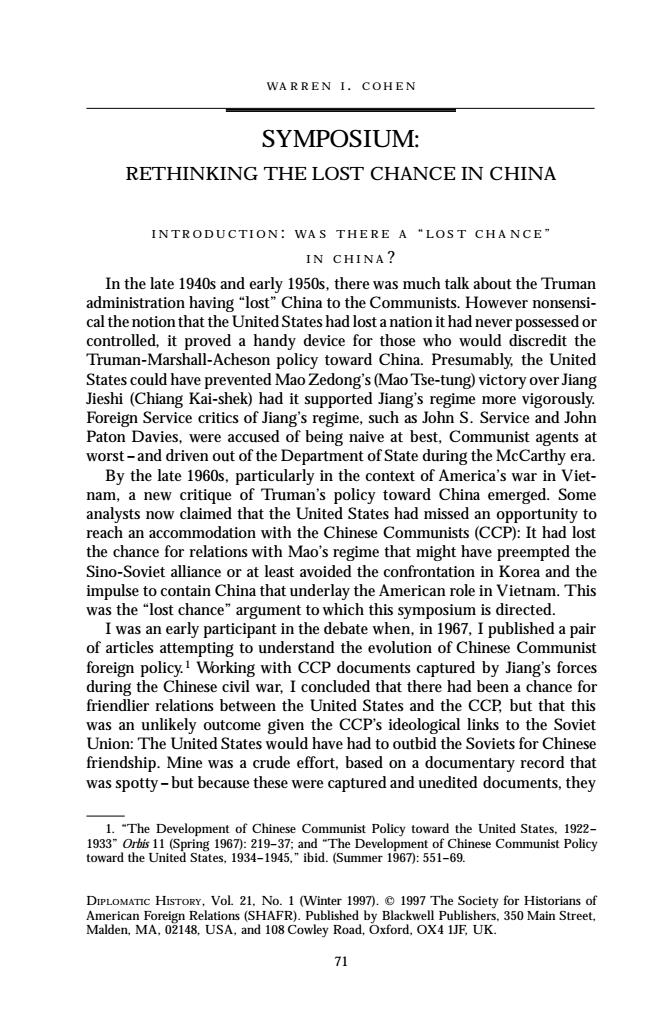正在加载图片...

WARREN I.COHEN SYMPOSIUM: RETHINKING THE LOST CHANCE IN CHINA INTRODUCTION:WAS THERE A "LOST CHANCE" IN CHINA? In the late 1940s and early 1950s,there was much talk about the Truman administration having "lost"China to the Communists.However nonsensi- cal the notion that the United States had lost a nation it had never possessed or controlled,it proved a handy device for those who would discredit the Truman-Marshall-Acheson policy toward China.Presumably,the United States could have prevented Mao Zedong's(Mao Tse-tung)victory over Jiang Jieshi (Chiang Kai-shek)had it supported Jiang's regime more vigorously. Foreign Service critics of Jiang's regime,such as John S.Service and John Paton Davies,were accused of being naive at best,Communist agents at worst-and driven out of the Department of State during the McCarthy era. By the late 1960s,particularly in the context of America's war in Viet- nam,a new critique of Truman's policy toward China emerged.Some analysts now claimed that the United States had missed an opportunity to reach an accommodation with the Chinese Communists(CCP):It had lost the chance for relations with Mao's regime that might have preempted the Sino-Soviet alliance or at least avoided the confrontation in Korea and the impulse to contain China that underlay the American role in Vietnam.This was the "lost chance"argument to which this symposium is directed. I was an early participant in the debate when,in 1967,I published a pair of articles attempting to understand the evolution of Chinese Communist foreign policy.1 Working with CCP documents captured by Jiang's forces during the Chinese civil war,I concluded that there had been a chance for friendlier relations between the United States and the CCP,but that this was an unlikely outcome given the CCP's ideological links to the Soviet Union:The United States would have had to outbid the Soviets for Chinese friendship.Mine was a crude effort,based on a documentary record that was spotty-but because these were captured and unedited documents,they 1."The Development of Chinese Communist Policy toward the United States,1922- 1933"Orbis 11(Spring 1967):219-37:and "The Development of Chinese Communist Policy toward the United States,1934-1945."ibid.(Summer 1967):551-69. DIPLOMATIC HIsToRY,Vol.21.No.1 (Winter 1997).1997 The Society for Historians of American Foreign Relations(SHAFR).Published by Blackwell Publishers,350 Main Street, Malden,MA,02148.USA,and 108 Cowley Road,Oxford,OX4 1JF,UK. 71WA R R E N I . C O H E N SYMPOSIUM: RETHINKING THE LOST CHANCE IN CHINA I N T R O D U C T I O N : WA S T H E R E A “ L O S T C H A N C E ” I N C H I N A ? In the late 1940s and early 1950s, there was much talk about the Truman administration having “lost” China to the Communists. However nonsensical the notion that the United States had lost a nation it had never possessed or controlled, it proved a handy device for those who would discredit the Truman-Marshall-Acheson policy toward China. Presumably, the United States could have prevented MaoZedong’s(Mao Tse-tung) victory over Jiang Jieshi (Chiang Kai-shek) had it supported Jiang’s regime more vigorously. Foreign Service critics of Jiang’s regime, such as John S. Service and John Paton Davies, were accused of being naive at best, Communist agents at worst – and driven out of the Department of State during the McCarthy era. By the late 1960s, particularly in the context of America’s war in Vietnam, a new critique of Truman’s policy toward China emerged. Some analysts now claimed that the United States had missed an opportunity to reach an accommodation with the Chinese Communists (CCP): It had lost the chance for relations with Mao’s regime that might have preempted the Sino-Soviet alliance or at least avoided the confrontation in Korea and the impulse to contain China that underlay the American role in Vietnam. This was the “lost chance” argument to which this symposium is directed. I was an early participant in the debate when, in 1967, I published a pair of articles attempting to understand the evolution of Chinese Communist foreign policy.1 Working with CCP documents captured by Jiang’s forces during the Chinese civil war, I concluded that there had been a chance for friendlier relations between the United States and the CCP, but that this was an unlikely outcome given the CCP’s ideological links to the Soviet Union: The United States would have had to outbid the Soviets for Chinese friendship. Mine was a crude effort, based on a documentary record that was spotty – but because these were captured and unedited documents, they 1. “The Development of Chinese Communist Policy toward the United States, 1922– 1933” Orbis 11 (Spring 1967): 219–37; and “The Development of Chinese Communist Policy toward the United States, 1934–1945,” ibid. (Summer 1967): 551–69. DIPLOMATIC HISTORY, Vol. 21, No. 1 (Winter 1997). q 1997 The Society for Historians of American Foreign Relations (SHAFR). Published by Blackwell Publishers, 350 Main Street, Malden, MA, 02148, USA, and 108 Cowley Road, Oxford, OX4 1JF, UK. 71